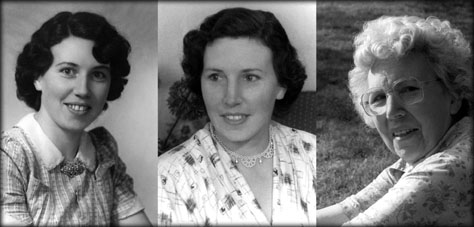
Click on pictures to enlarge them, then use the Back arrow to return here.
Vi Hardman, a face familiar to many associated with voluntary work, especially for the disabled, may have made her last appearance in the pages of her local papers. She died on 19th November 2002, shortly before her 87th birthday. Her funeral was held at Leatherhead Parish Church on 4th December, and her ashes were interred the next day.

Click on pictures to enlarge them, then use the Back arrow to return here.
During the fifty years that she lived in Leatherhead, Vi involved herself in many aspects of society. She began meeting local people from the age of ten, when her family moved from Ashtead to The Turrets, by the horse pond in Ewell, where her parents ran a market garden business with a little help from their daughters, Violet and Dorothy. A few readers may still remember buying their fruit, vegetables and eggs from the Marshalls there, until the late 1940s.
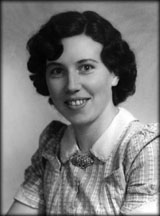 Running around for her parents took on a new direction in Vi’s teens, when she became an early member of the Women’s League of Health & Beauty, since renamed The Fitness League. Around 1931, she was one of 150 of their performers who demonstrated their aims and virtues in Hyde Park, London, to the music of a military band. The demonstration was a huge success for the League, generating positive press coverage all over the world. Sadly, the founder of the League died of cancer, as did Vi.
Running around for her parents took on a new direction in Vi’s teens, when she became an early member of the Women’s League of Health & Beauty, since renamed The Fitness League. Around 1931, she was one of 150 of their performers who demonstrated their aims and virtues in Hyde Park, London, to the music of a military band. The demonstration was a huge success for the League, generating positive press coverage all over the world. Sadly, the founder of the League died of cancer, as did Vi.
Having trained in Wimbledon for secretarial work, Vi worked in London for the Greenwich Linoleum Company, W. H. Smith at Strand House, and with Unilever as secretary to the Overseas General Manager. At Unilever, she was also on a rota for sounding the air-raid siren. Her colleagues nicknamed her Farina. In 1938, Vi met the brother of one of her friends from Smiths, and in 1945 she and Bill were married at the Parish Church in Ewell. They had three children: Valerie, Sylvia and Michael, and moved to Leatherhead in 1950.
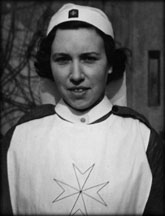 During the Second World War, Vi was an active member of the St John’s Ambulance Brigade and the Red Cross, in which capacities she was very much involved with attendance at theatres in the West End of London. However, she also experienced a personal drama that was critical to her life and consequently had profound effects on the lives of many others. Vi narrowly missed being killed by a flying bomb outside Waterloo Station. She had just got on a bus, considered sitting at the back, but changed her mind and sat at the front. She was looking down into her purse, to get change to pay her fare, when the bomb struck near the back of the bus. She later found out that a person sitting where she decided not to sit, had been killed. Due to her looking down, the flying glass largely missed Vi’s face. After a few days treatment, she went to Wales to recuperate on a farm. While based there, she visited several medical centres including Stoke Mandeville in Buckinghamshire, where she met Dr Guttmann, who pioneered the introduction of sport as part of the rehabilitation of patients. She had the opportunity of seeing at first hand how he attended and helped injured airmen. Motivated by this acquired knowledge, she decided that as soon as she had the opportunity, she would set up a club for disabled people. That was, in principle, the beginning of the Swans - in 1944 or 1945, though that name was not adopted until The Leatherhead Swans Club for the disabled was founded formally in 1975.
During the Second World War, Vi was an active member of the St John’s Ambulance Brigade and the Red Cross, in which capacities she was very much involved with attendance at theatres in the West End of London. However, she also experienced a personal drama that was critical to her life and consequently had profound effects on the lives of many others. Vi narrowly missed being killed by a flying bomb outside Waterloo Station. She had just got on a bus, considered sitting at the back, but changed her mind and sat at the front. She was looking down into her purse, to get change to pay her fare, when the bomb struck near the back of the bus. She later found out that a person sitting where she decided not to sit, had been killed. Due to her looking down, the flying glass largely missed Vi’s face. After a few days treatment, she went to Wales to recuperate on a farm. While based there, she visited several medical centres including Stoke Mandeville in Buckinghamshire, where she met Dr Guttmann, who pioneered the introduction of sport as part of the rehabilitation of patients. She had the opportunity of seeing at first hand how he attended and helped injured airmen. Motivated by this acquired knowledge, she decided that as soon as she had the opportunity, she would set up a club for disabled people. That was, in principle, the beginning of the Swans - in 1944 or 1945, though that name was not adopted until The Leatherhead Swans Club for the disabled was founded formally in 1975.
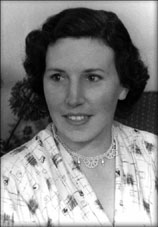 Vi founded The Swans club as soon as the Leatherhead Leisure Centre was opened, where it became one of the first resident clubs. The Swans’ purpose was, as Vi described it, "to welcome people of all ages and disabilities to come together, to make friends, through voluntary help in many ways, and to learn how to enjoy greater fulfilment and better health through the medium of physical exercise". She and a few friends formed the original committee, and steered the fledgling club through its formative years, and growing pains, to evolve into the large and well-respected club it is today. It has 150 members and a waiting list. In recent years, due to failing sight and hearing, broken bones, and having both shoulder joints replaced after her own muscles shattered them during anaphylactic shock, Vi handed over the running of the club to stalwarts such as Elaine Lush and Ann Hickey; but Vi always remained closely involved. The Swans has made a real difference to people’s lives, and enabled some to achieve fame, including medals at the Paralympic Games. Vi was secretary to the Leatherhead Sports Council, and a committee member of the British Sports Association for the Disabled - both roles that enabled her to further the cause of the Swans. In these positions, she was also influential in the design and alteration of many public buildings, such as the Leatherhead Leisure Centre - ensuring they showed proper consideration for access and use by disabled people. Her work for the advancement of sport for disabled people resulted in Vi receiving the 'Sport for All' individual award in 1975-76 from the Greater London & South East Sports Council. Vi also found the time to be Editorial Secretary for the newsletter of the Association of Recreation Managers. The Swans plan to hold an event in celebration of Vi’s life and work, in the spring of 2003.
Vi founded The Swans club as soon as the Leatherhead Leisure Centre was opened, where it became one of the first resident clubs. The Swans’ purpose was, as Vi described it, "to welcome people of all ages and disabilities to come together, to make friends, through voluntary help in many ways, and to learn how to enjoy greater fulfilment and better health through the medium of physical exercise". She and a few friends formed the original committee, and steered the fledgling club through its formative years, and growing pains, to evolve into the large and well-respected club it is today. It has 150 members and a waiting list. In recent years, due to failing sight and hearing, broken bones, and having both shoulder joints replaced after her own muscles shattered them during anaphylactic shock, Vi handed over the running of the club to stalwarts such as Elaine Lush and Ann Hickey; but Vi always remained closely involved. The Swans has made a real difference to people’s lives, and enabled some to achieve fame, including medals at the Paralympic Games. Vi was secretary to the Leatherhead Sports Council, and a committee member of the British Sports Association for the Disabled - both roles that enabled her to further the cause of the Swans. In these positions, she was also influential in the design and alteration of many public buildings, such as the Leatherhead Leisure Centre - ensuring they showed proper consideration for access and use by disabled people. Her work for the advancement of sport for disabled people resulted in Vi receiving the 'Sport for All' individual award in 1975-76 from the Greater London & South East Sports Council. Vi also found the time to be Editorial Secretary for the newsletter of the Association of Recreation Managers. The Swans plan to hold an event in celebration of Vi’s life and work, in the spring of 2003.
The conversion of the original Leatherhead Cottage Hospital to a home for disabled people saw Vi’s involvement. The premises were renamed Victoria House at the same time as the current Leatherhead Hospital was built. Many of the residents became Swans members, as did many others from the Leatherhead premises of Queen Elizabeth’s Foundation for the Disabled (QEFD), including Dorincourt, where Vi had been involved with fund raising through fêtes and a wine auction over many years.
Despite being busy bringing up three children, and making ends meet by making clothes rather than buying them, Vi found time to involve herself in school affairs. She was Chairman and vice-president of the Parents Association of Rosebery County Grammar School, Epsom in the 1960s; she was the first mother to become chairman. She was also Honorary Secretary of the Friends of Therfield School, Leatherhead, which raised £500 at their fete in 1964 - a goodly sum in those days, though par for the course going on the £1000 raised at two fetes at Rosebery around the same time. Such fund raising allowed Rosebery to meet its girls’ request for a swimming pool, and provided books and many other educational aids over the years. Vi and Bill proposed the name Therfield School, around 1963.
As well as being keen on enabling and promoting sport, Vi was keen to interest young people in music. She was co-ordinator of the Leatherhead Music for Youth Group in the mid-1970s. Their ‘Music at Christmastime’ concert at the Leatherhead Leisure Centre in late 1975 was very well received. This was one of the instances where Vi contributed to getting the Leisure Centre known in the community - early attention pivotal to its success. Piano and organ were Vi’s favoured instruments. Apart from playing piano at home, she played the organ at Westhumble and Mickleham churches.
Royalty came into Vi’s life from several directions. She talked with Diana Princess of Wales, who was patron of the Royal School for the Blind Charity (now trading as SeeAbility, where Vi was one of the first members, and was involved with yet more fund raising events. Vi visited Buckingham Palace several times for meetings of the Duke of Edinburgh Award committee, meeting Prince Phillip several times. When the Queen Mother visited QEFD at Leatherhead, Vi made the flower arrangements. (Vi was an accomplished member of the Dorking Flower Arrangement Group, she won the RHS’ Banksian Medal from the Mickleham and Westhumble Horticultural Society in 1971 and a diploma from the County of Surrey Flower Arrangement Association in 1974.) The Duke of Kent presented her with the Torch Trophy in 1982. Last, but certainly not least, Vi received the MBE from the Queen "for services to the local community and in particular the disabled".
Vi began work on the Cherkley estate, just outside Leatherhead, in the 1960s as a part-time personal assistant to Lady Aitken, but soon her work expanded to include estate management. She was responsible for the floral arrangements for the wedding of Lady Aitken’s son, now Lord Beaverbrook, by which time the post was a full time job. Vi often said how much she enjoyed her eighteen years working at Cherkley.
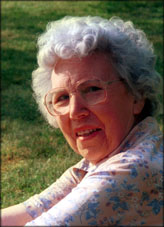 That estate management suited Vi because she liked the countryside, natural history, and gardening so much. Some of this enthusiasm inevitably rubbed off onto her children, leading to them studying geography and geology at University, and developing a keen interest in gardening, botany, and butterflies and moths to this day. Vi herself won several trophies for her garden, and despite becoming partially sighted through macular degeneration, she still delighted in glimpsing butterflies in her garden. In fact, she remained sufficiently interested and active after retirement, that she was awarded a 'Golden Years' award, for ‘top pensioner’ in 1986 by the Leatherhead Advertiser. One of the little things: she was responsible for the emblem atop Tesco’s in Leatherhead being changed from a cockerel (the emblem of Dorking) to a Swan (the emblem of Leatherhead).
That estate management suited Vi because she liked the countryside, natural history, and gardening so much. Some of this enthusiasm inevitably rubbed off onto her children, leading to them studying geography and geology at University, and developing a keen interest in gardening, botany, and butterflies and moths to this day. Vi herself won several trophies for her garden, and despite becoming partially sighted through macular degeneration, she still delighted in glimpsing butterflies in her garden. In fact, she remained sufficiently interested and active after retirement, that she was awarded a 'Golden Years' award, for ‘top pensioner’ in 1986 by the Leatherhead Advertiser. One of the little things: she was responsible for the emblem atop Tesco’s in Leatherhead being changed from a cockerel (the emblem of Dorking) to a Swan (the emblem of Leatherhead).
After all this it is perhaps not surprising that, in 1990, Vi received Surrey County Council’s ‘Award for Achievement’, "in recognition of outstanding personal contribution to the community in the County of Surrey".
So much might have been different if Vi had not changed her mind about where to sit in that bus when the bomb exploded. Fate intervened later, too, Vi having an appointment to join the United Nations in Luzern, which had to be cancelled because her father was knocked off his bicycle by a car in Epsom. Many people have been lucky because events turned out the way they did. Despite her own increasing disabilities, Vi retained an interest in the people and issues that had occupied her throughout her life, remaining kind and patient. Many will miss her, but many of the differences she made will endure.